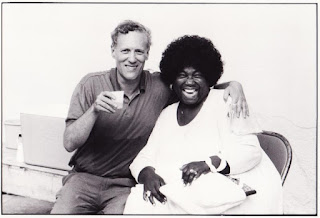Gospel History: "Best Of" album from gospel pioneer Marion Williams released
buzzz worthy. . .
 |
| Anthony Heilbut and Marion Williams in 1987. |
Were it not for Gospel music, Rock 'n' Roll, Rhythm & Blues, Soul and the Blues would not exist. Gospel music, from its earliest church moan, has been the bedrock of American music. One of its greatest proponents is Marion Williams who Rolling Stone Magazine called "the greatest singer ever." The Pioneering Gospel singer's unrelenting four-octave range, unrivaled swooping phrases, uncanny sense of timing, mesmerizing whoops, leaps and growls, changed music and not just Gospel forever. The essence of Marion Williams' sound is evidenced in the music of such diverse music icons as Nina Simone, Little Richard, James Brown, Aretha Franklin and The Beatles. Little Richard's octave-leaping high whoops on "Tutti Frutti" and other classics are testament to Marion Williams' influence and Aretha Franklin's versions of Williams' biggest hits "Surely God Is Able" and "Packin' Up," confirm the 'Queen of Soul's' admiration for the Gospel great. Shanachie Entertainment's newly issued Marion Williams release, Packin' Up: The Best of Marion Williams,illustrates the depth of Marion Williams' artistry. From hair-raising and raucous Rock 'n' Roll inflected show-stopping performances, to the more subtle folkloric understated takes and blues and jazz tinged sets, Packin' Up: The Best of Marion Williams is exhilarating from the first note to the last. This must-have collection brilliant captures Williams' ecstatic highs and haunting lows and proves why she will remain one of the greatest musical forces in American music.
Produced by noted gospel scholar and Grammy winning producer Anthony Heilbut, Packin' Up: The Best of Marion Williams features 26 tracks that include 13 previously unissued cuts and extensive liner notes written by Heilbut, the author of the groundbreaking book, The Gospel Sound, which remains in print after 44 years and is one of the definitive books on gospel music. James Baldwin called it "A very beautiful book...tough and lucid." His latest critically lauded book, The Fan Who Knew To Much: The Secret Closets of American Culture won the ASCAP Deems Taylor Award. Heilbut states, "Marion Williams' improvisatory skills, her usage of time and sense of harmony place her among the best of the American singers right alongside Louis Armstrong, Bessie Smith, Billie Holiday, Dinah Washington and Mahalia Jackson." He adds, "From solemn a cappella hymns that could have been field recordings to the fiercely rhythmic songs identified with the sanctified church and male quartets to the blues-saturated compositions of the mid-40s, Marion was the only one of the classic gospel singers who excelled in all sub-genres. Who else could have inspired such diverse musical figures as Little Richard and Nina Simone?" Tony Heilbut was a 16-year old freshman at Queens College when he first met Williams. As a youth, the native New Yorker attended many of the Apollo Theatre's gospel concerts. Later as a first-year Ph D. Student at Harvard, he was responsible for bringing Marion to the school, undoubtedly the first time the gospel sound had swept that austere institution. Heilbut never imagined that he would later go on to produce and become life-long friends with Williams. He would also become one of her greatest champions. On the strength of their collaborations with one another, Marion would go on to become the only gospel singer to receive a MacArthur Genius Grant or Kennedy Center Honors Award.
Packin' Up: The Best of Marion Williams features performances from 1957 to 1993 and radiates the richness and power of gospel music. Highlights include the riveting title track, recorded at the famed 1957 Newport Jazz Festival, which beautifully illustrates how much Rock 'n Roll owes Marion Williams.
Further evidence is given on the memorable tracks "Didn't It Rain," You've Got to Move" and the politically and socially charged "The New Burying Ground," which references such charged issues as welfare and Medicare. Marion Williams heavily influenced the iconic Nina Simone, can be heard on one of Nina's biggest hits "I Wish I Knew How It Felt To Be Free." The way the 'High Priestess of Soul' teases the beat and climaxes to a rousing finale pays homage to Marion's captivating and spell-binding performances. "I Have A Friend," "Motherless Children," "I'll Be All Right" and "Live The Life" are all songs that show how Marion may have laid down foundation for some of the deeply rooted gospel undertow heard throughout Nina Simone's music.
| A young Marion Williams singing to an enthralled C.L. Franklin (Aretha Franklin's Father) around 1955 |
Marion Williams was born a survivor in Miami, FL. She was the youngest of eleven children and only three of her siblings survived past their first year. Her mother sang in the church choir and before long Marion was singing right beside her. As a teen during a visit to Philadelphia Marion had the great fortune to be heard singing by Clara and Gertrude Ward who instantly recognized her talent and invited her to join the Ward Singers, a premier gospel group at the time. Williams toured the world with them and in 1959 she formed her own gospel group, the Stars of Faith, which toured widely and by 1965 she set out on her own. In 1991, Williams performed as a gospel singer in the film Fried Green Tomatoes though her scene is available only in the director's cut. The movie was dedicated to her. In 1993, not long before her untimely passing, Marion was honored by the MacArthur Foundation. They declared that Williams was among "the last surviving links to gospel's golden age...one of the most versatile singers of her generation." The same year, Williams was also one of the recipients of the Kennedy Center Honors. Her tribute included an all-star lineup featuring appearances by Billy Preston, Little Richard and Aretha Franklin. Little Richard declared on stage that evening, "I love you baby because you made me a star, because you gave me my note." With the release of Packin' Up: The Best of Marion Williams may Marion Williams' song be everlasting and her legacy shine ever so brightly.

